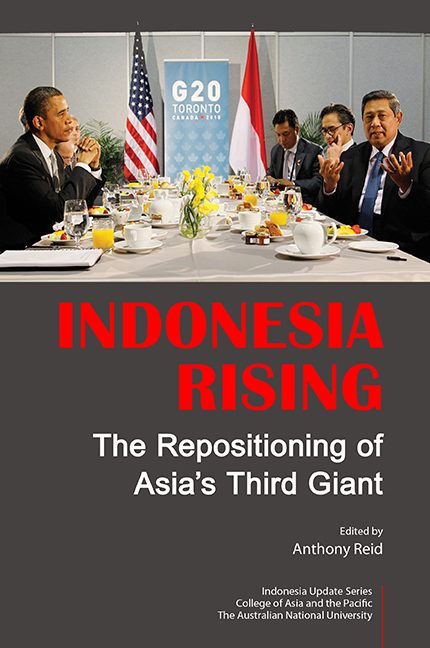Book contents
- Frontmatter
- Contents
- Tables
- Figures
- Contributors
- Foreword by Gareth Evans
- Preface
- Glossary
- 1 Indonesia's New Prominence in the World
- 2 Indonesia in the New World Balance
- 3 Indonesia's Role in the World Economy: Sitting on the Fence
- 4 Is Indonesia Rising? It Depends
- 5 Domestic Politics and International Posture: Constraints and Possibilities
- 6 Can Indonesia Lead on Climate Change?
- 7 Indonesian Muslims and Their Place in the Larger World of Islam
- 8 Indonesia's Quiet Springtime: Knowledge, Policy and Reform
- 9 Problems of Identity and Legitimacy for Indonesia's Place in the World
- Index
- INDONESIA UPDATE SERIES
4 - Is Indonesia Rising? It Depends
Published online by Cambridge University Press: 21 October 2015
- Frontmatter
- Contents
- Tables
- Figures
- Contributors
- Foreword by Gareth Evans
- Preface
- Glossary
- 1 Indonesia's New Prominence in the World
- 2 Indonesia in the New World Balance
- 3 Indonesia's Role in the World Economy: Sitting on the Fence
- 4 Is Indonesia Rising? It Depends
- 5 Domestic Politics and International Posture: Constraints and Possibilities
- 6 Can Indonesia Lead on Climate Change?
- 7 Indonesian Muslims and Their Place in the Larger World of Islam
- 8 Indonesia's Quiet Springtime: Knowledge, Policy and Reform
- 9 Problems of Identity and Legitimacy for Indonesia's Place in the World
- Index
- INDONESIA UPDATE SERIES
Summary
Increasingly since the mid to late 2000s, Indonesia has been chosen for inclusion in creative acronyms that shortlist countries with unusually bright prospects for material growth. In this upbeat genre, Indonesia has been seen both as a cat (a ‘tiger’, or one of the CIVETS) and as a bird (an EAGLE). ‘And it's not just an economic story’, enthused Joshua Keating in Foreign Policy in December 2010. ‘Indonesia stands a good chance of becoming the world's first Muslim and democratic superpower’ (Keating 2010).
Will Indonesia's political economy fulfil these high expectations? As a Muslim Indonesian might say, Wallahu'alam – only God knows. This chapter aims merely to explore and characterize the recent ‘rise of Indonesia’ to the extent that it is already taking place.
The domestic roots and repercussions of foreign policy are important in this context but they are not my focus here. Indonesia's perceived ascent is largely a product of its interaction with, and its portrayal by, the outside world. The stronger the political economy of Indonesia, other things being equal, the more likely its leaders will be to engage proactively, on Indonesian terms, with that wider world. But because other things are not equal, the argument in this chapter is contingent and possibilistic. One cannot infer a benign or a malign ‘rise of Indonesia’ from economic growth and political stability alone. The country's large size, young population and stable democracy have contributed to that perception, but they are not a sufficient condition for its existence. Structure without agency is mere potential. Actual outcomes will depend on what both local and foreign decision makers see, say and do – and do not see, say or do – to augment, diminish or reorient Indonesia's position in foreign affairs.
Is Indonesia rising? This chapter examines the question from different angles. Objectively, how steeply upward are Indonesia's rates of economic growth and military spending compared with the trends in other countries? Subjectively, in global discourse, is Indonesia seen to be rising, again compared with the profiles of other states? On balance, is the acronymic optimism cited above a recognition of Indonesia's past success – or a prediction of future achievement that is causing what it foretells?
- Type
- Chapter
- Information
- Indonesia RisingThe Repositioning of Asia's Third Giant, pp. 49 - 76Publisher: ISEAS–Yusof Ishak InstitutePrint publication year: 2012

